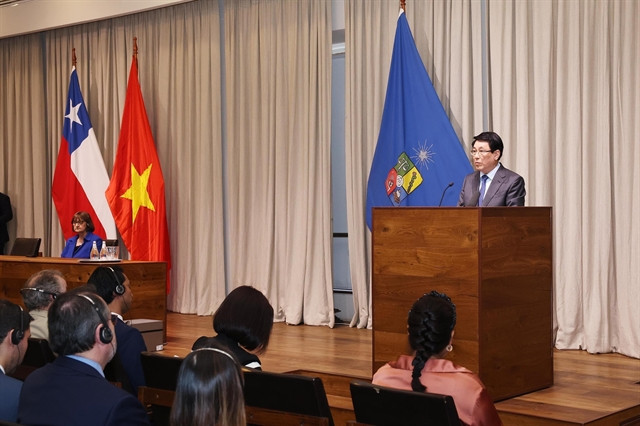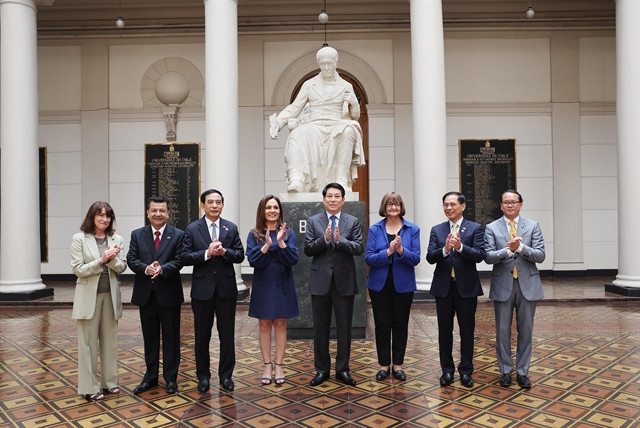 |
| State President of Việt Nam Lương Cường delivers a policy speech at the University of Chile in Santiago on November 12. — VNA/VNS Photo |
Established in 1842, the university is the largest and oldest educational institution in the country and also one of the oldest in the region, having trained many prominent scientific and cultural figures as well as international influencers, including many Presidents of Chile such as Gabriel Boric who is now in office.
In his remarks, Cường mentioned some issues that form the foundation of the Việt Nam - Chile relations, the development path and foreign policy of Việt Nam, as well as the vision and orientation for the two countries’ traditional friendship and comprehensive partnership in the new era.
Special similarities
Despite the half-of-the-earth distance, he said, Việt Nam and Chile always have special bonds which come from their many rare similarities in terms of history, culture, geography, economic development model, and vision about the world today.
He noted that both countries are developing nations and members of the Non-Aligned Movement, with long-standing and glorious histories of struggles for national independence, and also show strong determination and efforts in national development.
The Vietnamese people never forget the solidarity from the Chilean people during the years full of hardships of the fight for national independence, with the most impressive being young Chileans’ protests against the war in Việt Nam, President Cường said.
The President added in terms of economy, both countries are export-driven economies and attach importance to international integration to promote their national development. This could be seen in the fact that they are members of international organisations and big multilateral and inter-regional free trade agreements such as the World Trade Organisation (WTO), the Comprehensive and Progressive Agreement for Trans-Pacific Partnership (CPTPP), the Asia-Pacific Economic Cooperation (APEC), and the Forum for East Asia - Latin America Cooperation (FEALAC).
He affirmed that with an open and inclusive vision as well as support for trade liberalisation, the two sides share a common perspective on building and consolidating a multipolar, equitable, and international law-based world order in which countries in the Global South hold an increasingly important role and voice.
The two countries also made commitments and are taking strong measures to achieve carbon neutrality by 2050. Both are aware of the importance of green and sustainable development, energy transition, digital transformation, along with the proper management of strategic minerals.
Lauding the outstanding socio-economic development achievements of Chile, the first in Latin America and one of the few developing countries that have escaped the “middle-income trap”, the Vietnamese leader perceived that Chile is a typical example of optimising globalisation and trade liberalisation in national development.
Chile is increasingly affirming its stature and role in the region and the world, Cường went on, expressing Việt Nam's wish to learn from the country's precious experiences in economic development so that it can become a developed nation by 2045.
Việt Nam's development path and foreign policy
Mentioning Việt Nam's development path, the State President said nearly 80 years after its founding and almost 40 years of reform, Việt Nam is standing at a historic turning point of the new era – the era of the nation’s rise.
From a poor, backward, heavily war-torn country once blockaded and subject to severe embargoes, Việt Nam has risen to reap significant achievements, earning the status of a middle-income developing country that is intensively and extensively integrating into the world, he said, adding its economy has grown 95 folds, now ranking 35th among the world's 40 largest economies and the top 20 in terms of foreign investment attraction and trade scale.
With regard to foreign relations, Việt Nam has established diplomatic ties with 194 countries with 32 strategic partnerships and comprehensive partnerships, including with all the five permanent members of the United Nations Security Council as well as the G7 economies.
The leader went on to say that Việt Nam now has trade relations with over 220 countries and territories, with trade turnover reaching US$683 billion in 2023 and expected to hit a record of nearly $800 billion this year. With 17 free trade agreements (FTAs) and nearly $450 billion in foreign direct investment (FDI) invested in 41,000 projects from over 143 countries and territories, Việt Nam has become a crucial link in the Asia-Pacific and global supply chains.
The State President highlighted Việt Nam as a bright spot in the implementation of the UN Millennium Development Goals and the 2030 Sustainable Development Agenda. Việt Nam has considered climate change response as a top priority and put in place specific policies to ensure that all citizens benefit from the achievements of national development and innovation. Although its per capita income remains at the lower-middle level, its Human Development Index (HDI) has consistently ranked high for years.
State President Cường stressed that the country persistently pursues the goal of national independence linked to socialism under the leadership of the Communist Party of Việt Nam, considering this the lodestar in national defence and development. Việt Nam's goal is to become a developing country with modern industry and upper-middle income by 2030 and become a developed nation with high income, he said.
The leader also noted that Việt Nam will continue its foreign policy of independence, self-reliance, peace, friendship, cooperation, development, and multilateralisation and diversification of relations; being a friend, a reliable partner, and an active and responsible member of the international community; and proactive, intensive, extensive and comprehensive international integration.
Việt Nam shares other countries’ views on the importance of ensuring a peaceful and stable environment in all regions, and wishes to contribute more to global politics, the global economy, and mankind's civilisation, the leader stated.
He also underlined Việt Nam's "four Nos" defence policy - not partaking in military alliances, not siding with one country to act against another, not allowing foreign countries to set military bases or use Việt Nam's territory to counter a third country; not using force or threatening to use force in international relations. Việt Nam consistently advocates for peaceful settlement of disputes based on the UN Charter and international law, and opposing unilateral actions, coercive politics, and the use or threat to use force in international relations.
Amid intensifying strategic competition among major powers, the State President emphasised the increasingly important role of Southern countries as well as South-South cooperation.
Việt Nam actively participates and contributes constructively to joint efforts, fulfilling key roles in various multilateral mechanisms and engaging in UN peacekeeping operations and international search and rescue operations, he remarked.
 |
| President Lương Cường and the leadership of the University of Chile. — VNA/VNS Photo |
Vision and orientations for Việt Nam - Chile relations
Reviewing the history of the Việt Nam-Chile friendship ties over the past 50 years, the State President said that at his talks and meetings with Chilean leaders, the two sides agreed on the principles and major directions of cooperation to bring the bilateral comprehensive partnership to a new height, and make it more extensive, effective and practical. The two sides also reaffirmed common values such as treasuring peace, the spirit of independence and self-reliance, upholding multilateralism, respecting international law and the strength of international friendship and solidarity.
Based on the solid foundation of more than 50 years of the bilateral relations, historical similarities and common vision of the world, and high economic complementarity, the leader proposed a number of orientations for the Việt Nam-Chile relations in the coming period, in which the two countries need to enhance political trust and practical cooperation through the exchange of delegations at all levels, enhance mutual understanding and mutually beneficial cooperation in areas where both sides have potential and strengths, including exchanges and cooperation between the Communist Party of Việt Nam and major political parties in Chile.
President Cường proposed promoting the connection between the Vietnamese and Chilean economies, and defining economic cooperation as the top priority and the key area in the bilateral relationship. In particular, it is necessary to continue to take advantage of and effectively implement the bilateral Free Trade Agreement (FTA) and the Việt Nam - Chile Free Trade Council mechanism, as well as the Comprehensive and Progressive Agreement for Trans-Pacific Partnership (CPTPP) to create new momentum to bring trade and investment relations between Việt Nam and Chile to new milestones.
He also held that it is necessary to further promote bilateral investment opportunities as well as identifying priority areas of strategic breakthrough cooperation, helping to connect the two economies, towards sustainable development, contributing to the common prosperity of the world, especially in the fields of green transition, climate change response, building appropriate cooperation frameworks in international organisations, forums and mechanisms of which both sides are members.
The State President also proposed promoting educational cooperation, cultural and artistic exchanges, and developing tourism cooperation, thereby enhancing people-to-people exchanges and mutual understanding. In that process, the University of Chile can make important contributions and Việt Nam encourages cooperation between universities of the two countries. This is an extremely important factor to promote understanding, knowledge sharing, and innovation cooperation.
According to the leader, in a world with many fluctuations and challenges, small and medium-sized countries like Việt Nam and Chile must strive to contribute more actively to global governance, and promote multilateral approaches and international law. Many new international issues such as green development, energy transition, and artificial intelligence governance need to have a more comprehensive international framework soon.
Việt Nam and Chile need to continue promoting multilateral cooperation, respecting international law, maintaining security, safety, freedom of navigation and aviation in seas and oceans, including the Pacific Ocean, in accordance with international law, especially the 1982 United Nations Convention on the Law of the Sea (UNCLOS).
President Cường expressed his belief that with good traditional relations, goodwill and potential for bilateral comprehensive cooperation, the Việt Nam - Chile relationship will continue to reach new heights, for the benefit of the people of the two countries, and for peace, cooperation and development in the two regions and the world.
This marks the final activity of State President Cường's official visit to Chile. On the afternoon of November 12 (local time), the State President and the high-ranking delegation of Việt Nam departed for an official visit to Peru, where he will attend the 2024 APEC Economic Leaders’ Week in Lima from November 12-16. — VNA/VNS